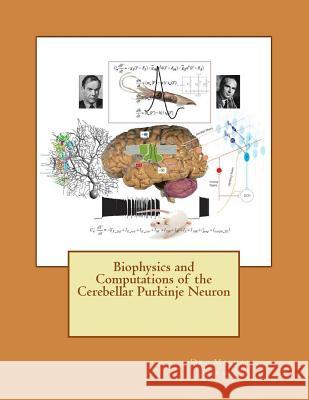Biophysics and Computations of the Cerebellar Purkinje Neuron » książka
Biophysics and Computations of the Cerebellar Purkinje Neuron
ISBN-13: 9781502454546 / Angielski / Miękka / 2014 / 118 str.
Neuroscience is the scientific study of the nervous system. Its aim is to understand how the nervous system works, discover what goes wrong in its diseased/injured states and to develop treatments to fix these pathological states. Computational Neuroscience is the use of computers to analyse and model electrical recordings from the brain, in order to elucidate how the brain computes. It is instrumental to present efforts to try and crack the "neural code" i.e. to decode the, as yet largely unknown, cipher that specifies how information is encoded in the electrical and chemical signals of the nervous system; a "holy grail" of modern science. This book suggests that the sodium-potassium pump may not simply be a homeostatic, "housekeeping" molecule for ionic gradients; but might be a computation element in the cerebellum and the brain. This concept runs contrary to conventional, entrenched viewpoints on brain function. Artificial Intelligence (AI) research typically builds on the fiction that neurons are simple linear threshold units, and that the immense computational power of the brain comes from having a great many of them. This book challenges this assumption, showing that the non-linear biophysics of synapses, dendrites, ion pumps, ion exchangers, intracellular ion dynamics and voltage-dependent ion currents intersect to permit the cerebellar Purkinje neuron to perform complex computations upon its inputs. This book will please those curious about brain computation, especially the computational capability of single neurons, and presents both computational and experimental approaches to neuroscience. Much of its content is new, primary research.
Zawartość książki może nie spełniać oczekiwań – reklamacje nie obejmują treści, która mogła nie być redakcyjnie ani merytorycznie opracowana.











